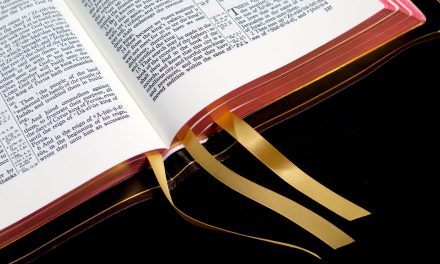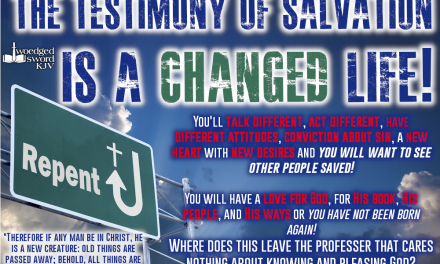“Let every soul be subject unto the higher powers. For there is no power but of God: the powers that be are ordained of God.” Romans 13:1
Shining light on our Presidential Election 2016
I. The Responsibilities of a Nation’s Leaders (13:1-6)
The following is by Dr. John Phillips excerpted from Exploring Romans
The responsibilities of a nation’s leaders are both Godward and manward. Since it is the Christian’s duty to “render unto Caesar the things which are Caesar’s,” Paul emphasizes how Caesar is to behave. There are clearly rare occasions when a Christian must respectfully decline to obey a governmental order (Acts 5:29). The Bible frowns on civil disobedience. God is on the side of constituted authority.
A. The Godward Responsibilities of Rulers (13:1-2)
Human government derives its authority from God. Paul shows that governments are (1) appointed by God. He says, “Let every soul be subject unto the higher powers. For there is no power but of God: the powers that be are ordained of God” (v. 1). Human government was inaugurated by God after the flood when He placed into Noah’s hand the sword of the magistrate. “Whoso sheddeth man’s blood, by man shall his blood be shed” (Gen. 9:6) were the words which launched man on the road to self-government under God. The highest function of government is the judicial taking of life, the one thing emphasized in the divine decree. All other functions of government are implied in that.
Like everything else entrusted to man, human government soon failed. The sword of the magistrate became the sword of the conqueror. The right to legislate and govern man proved to be a heady wine for a fallen race. The story of the tower of Babel shows how man used his new-found authority to plan organized rebellion against the very throne of God itself. Up until this time rebellion had been on an individual basis, now it had become federated. The world’s first “united nations” with headquarters at Babylon symbolizes the last one. Genesis 11 and 12 foreshadow Revelation 13, 17-18.
Despite the abuses of governmental power, human government is still a divine institution. “The powers that be are ordained of God.” The word “powers” here means “delegated authorities” and the word “ordained” means “appointed.” Evil men may be elected to power or may seize power. They may have no thought of God at all, but the very fact that He permits them to seize the reigns of government means that He has a purpose to fulfill even through their misrule. It is a saying ell worth considering that “people get the kind of government they deserve.” Governments may be weak or strong, just or oppressive, benevolent or cruel, wise or foolish, but in each case God has His way and moves His own plans forward. Democracies and dictatorships alike are under His control. God balances one nation off against another. He uses one nation to chastise another. Nations come and go, kingdoms rise and fall, empires wax and wane, but behind them all is God, overruling in the affairs of men. Wars and rumors of war, famines and pestilences, depressions and disasters—all are woven into the fabric of history. From our viewpoint the strands may seem tangled, meaningless, hopelessly knotted, unequal and wrong. But the tapestry He is weaving is perfect, and all the pressures of Satanic force and human sin are gloriously overruled by a God who is both omnipotent and omniscient. What James Russell Lowell said of individuals is just as true of nations:
“Careless seems the great Avenger; history’s pages but record
One death-grapple in the darkness ’twixt old systems and the Word.
Truth forever on the scaffold, Wrong forever on the throne—
Yet that scaffold sways the future and, behind the dim unknown,
Standeth God within the shadow, keeping watch above His own.”
One of the great lessons of the book of Daniel is that God keeps a firm hand on history. Nebuchadnezzar, mighty king of Babylon, had to learn that “the heavens do rule” (Dan. 4:26). When after a terrible experience this truth was brought home to him, he issued a formal state document in which he asserted: “I blessed the most High, and I praised and honoured him that liveth for ever, whose dominion is an everlasting dominion, and his kingdom is from generation to generation: and all the inhabitants of the earth are reputed as nothing: and he doeth according to his will in the army of heaven, and among the inhabitants of the earth: and none can stay his hand, or say unto him, What doest thou?” (Dan. 4:34-35). The whole of Bible history is intended to reinforce the truth that “the powers that be are ordained of God.”
Paul goes on to show that governments are (2) approved by God. He says, “Whosoever therefore resisteth the power, resisteth the ordinance of God: and they that resist shall receive to themselves damnation” (v. 2). Disobedience to governmental authority is disobedience to God and will be judged. The rule of law militates against the right of an individual to decide which laws are right and which laws are wrong, and to take it upon himself either to obey or disobey just as he pleases. Such a philosophy leads to anarchy, riot and national disintegration. If a law is unjust it must be repealed through legal channels not just disobeyed.
Since governments are appointed by God they must be obeyed. On the other hand, those in positions of government must recognize the fact that their authority is derived from God. They are not appointed to public office in order to promote their own selfish interests. They are there to represent God’s rule on the earth. Therefore they must acknowledge God in the administration of national affairs. They must uphold divine principles of righteousness and they must refrain from legislation which would undermine the individual’s right to worship God according to the dictates of his conscience. It is significant that the divine ideal of an Old Testament king was a shepherd. (Dr. John Phillips commentary on Romans 13:1.)






